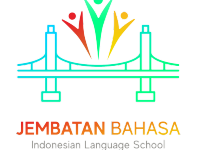Bahasa language or simply Bahasa is a common misconception term for Indonesian language. I often get a surprise look when my students find out that “bahasa” means “language”. Then they start to realize the term doesn’t really make sense.
There are two ways to refer to the official language of republic Indonesia. Internationally, it’s known as Indonesian or Indonesian language. Locally, it is Bahasa Indonesia.
Malaysia, however, call their official language “Bahasa Malaysia” or Malay. Both Indonesia’s and Malaysia’s official language derive from Malay, an Austronesian language spoken across the Malay World. However, both official languages have evolved into different versions of Malay, so it makes sense to name differently: Bahasa Malaysia and Bahasa Indonesia.
As Bahasa Indonesia is too long, people leave Indonesia and use only Bahasa to refer to the language. Things spread out and people use the term without knowing what it really means.
Many Indonesian teachers also contribute to this. Being a teacher in an international school, I often notice Indonesian teachers promote the term. For examples, teachers would say when their students speaking English in their class “Please speak in Bahasa”. Or when they ask the meanings of words to their students “how do you say this in Bahasa?”.
The international students who will likely study abroad after their high school education in Indonesia, and they will carry the term on the back of their head with them.
That is my theory on how Indonesian is called bahasa language. This is based on my personal experience as an Indonesian teacher as a foreign language.
Now you know a bit of background and real meaning of bahasa, I hope you won’t use the term incorrectly again. Based on my experience, most Indonesians don’t understand the term, except Indonesian teachers who teach foreigners. In fact, I first heard this term when I started my career as an Indonesian teacher for foreign speakers.
